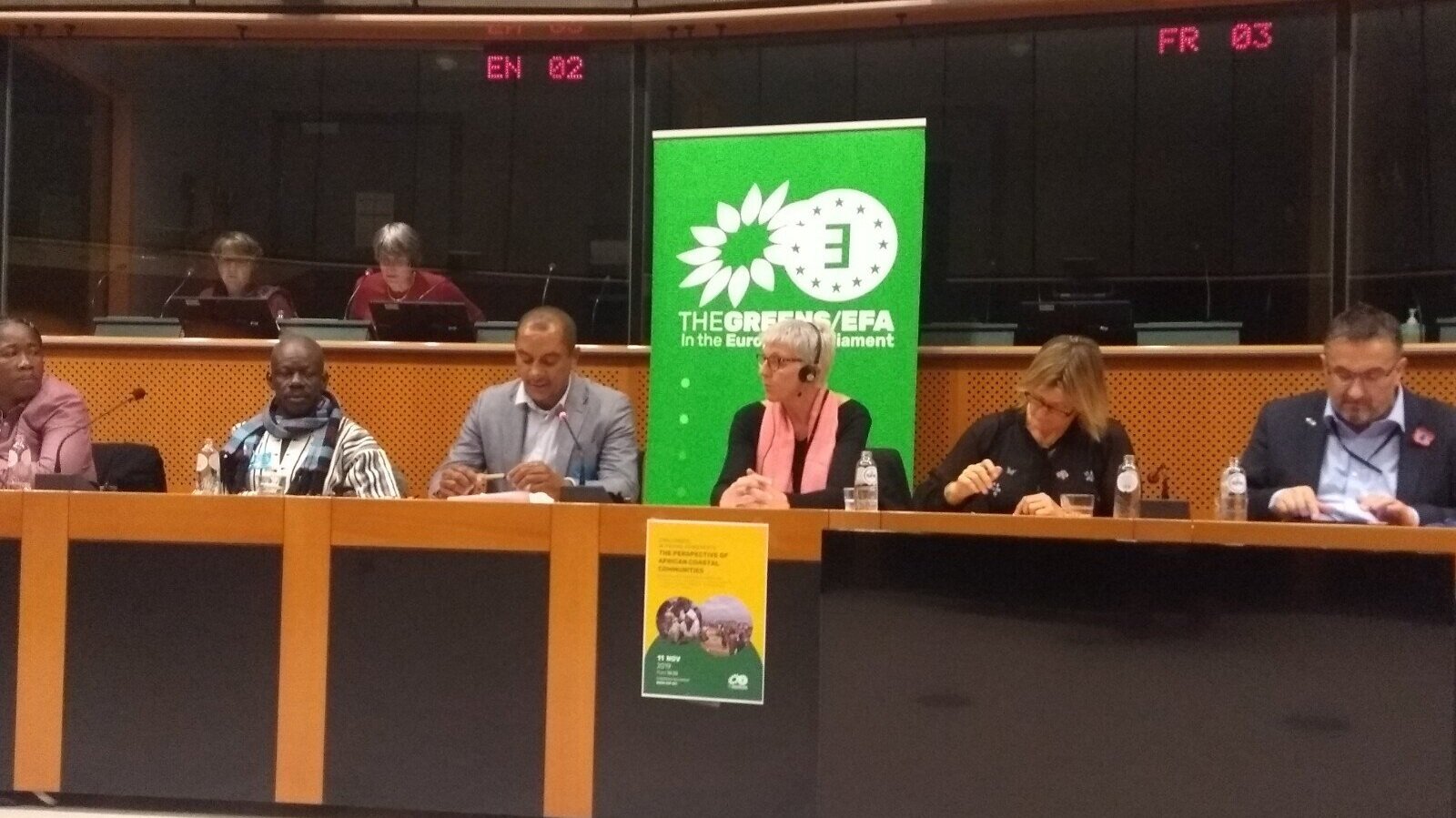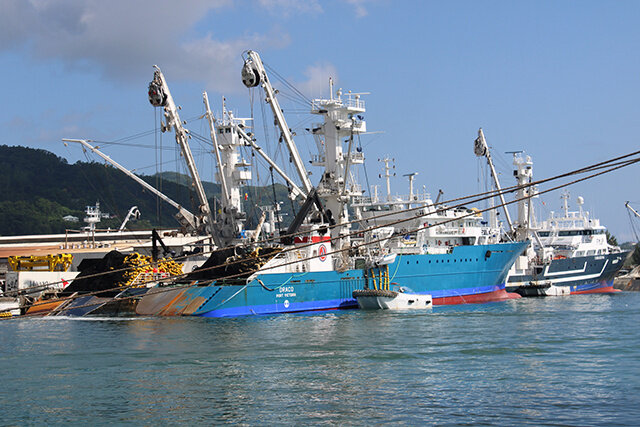Seychelles is the first country in the world to have formally launched its annual report to the Fisheries Industry Transparency Initiative (FiTI).
The report brings to light key information on Seychelles’ fisheries, assessing its compliance against the transparency requirements set up in the FiTI standard, and looks at a range of issues, including transparency in foreign access agreements, law enforcement, small-scale and large-scale fisheries and beneficial ownership. Seychelles FiTI Multi-Stakeholder Group (MSG), composed of an equal number of Government, business and civil society representatives, provides recommendations to the national authorities on how the publication of information on these various issues can be further improved.
As a preamble, Philippe Michaud from Seychelles Ministry of Fisheries and the Blue Economy (MFBE), and Chair of the FiTI National MSG, highlights how transparency is essential for stakeholders’ participation: “This ambitious exercise is a clear testament to the importance Seychelles places on transparent marine fisheries […]. It is hoped that all bona fide stakeholders (Seychellois as well as our international partners) will realise that the prosperity and development of the fisheries sector depends on the active participation of all. For this to happen, it is essential that the information is available, accessible and complete.”
A reporting process that already triggered progress
The reporting process itself has already led to improved transparency. Previously undisclosed information is now public, including the texts of two agreements with Mauritius: an agreement for Mauritian vessels to fish in Seychelles’ waters, and an agreement for Seychelles-flagged vessels to fish in Mauritius’ waters.
However, the report notes that the texts of the private fishing access agreements signed by Seychelles with three companies, - Taiwan Deep-sea Tuna Longline Boat Owners and Exporters Association (TTA), Top Fortune International (TFI), and Dongwon-, are not published. The first two agreements, TTA and TFI, contain articles preventing Seychelles from divulging content of the agreements without prior written approval of the other party. As part of the FiTI reporting process, the Seychelles Government announced it will endeavour to remove such confidentiality clauses from any future fisheries access agreement. In the case of Dongwon, a company also active in other African countries waters, it appears that no written agreement exists.
On the other hand, while the agreements between Seychelles and the EU and between Seychelles and Mayotte, one of the EU Outermost regions, are both published on the EU website, they are not on a Seychelles government website. The publication of these agreements by Seychelles will be an important step to ensure adequate consultation of local stakeholders.
In 2019, at the time of the last EU agreement protocol negotiations, the Seychelles Fishing Boat Owners Association’s President, Keith André, addressed the EU Parliament calling for more transparency, particularly on how the monies of the EU agreement sectoral support are used. The FITI report confirms that the use of the sectoral support for the last protocol (2014-2020) has been evaluated, twice, but reports are not publicly available. As part of the FiTI reporting process, the MFBE indicated that a mechanism is currently being established for “improving the monitoring of sectoral support” under the EU-Seychelles SFPA. Public information about the projects funded with the sectoral support would undoubtedly increase public awareness regarding the impacts of those projects and improve government accountability.
Another key demand of the local artisanal fishing sector has long been the need for better consultation of stakeholders during the preparation, negotiation or monitoring of foreign access arrangements. The FiTI report indicates that “until 2019, all discussions undertaken prior to renegotiation and signing of new foreign fisheries access agreements have been done primarily within the government. Representatives of local fishers were only consulted in certain cases,” but there is no record of such consultations. The need for progress in that area has been identified by the national MSG, which recommends, amongst other things, that the MFBE publishes, in a timely manner, all information from national stakeholder consultations undertaken with respect to these foreign fishing access agreements.
Fisheries under the radar, artisanal fisheries invisible
The FiTI report underlines that the fisheries value chain in Seychelles, from the catching to the processing, is one of the main pillars of the country’s economy, crucial also for food security and job creation. However, it also says that, “based on the official published government information, the GDP contribution of the fisheries sector in Seychelles is surprisingly low,” accounting in 2019 for only 0.9% of total GDP. “One explanation for this is that the production of canned tuna is not considered when calculating fisheries’ contribution to the GDP.” Another issue is the lack of fisheries specific data, as “official employment statistics group data for agriculture, forestry and fisheries together.” Moreover, “these statistics do not consider employment in fishing related industries and services, such as the tuna cannery, quality control companies, or government staff employed at SFA [Seychelles Fisheries Authority, ed.] and MFBE.”
The sector of small-scale fisheries has received even less attention: the number of licenses in Seychelles’ small-scale fisheries is not published, and “information that has been given as part of this FiTI reporting process cannot be seen as complete.” There are also no up-to-date evaluations or audits of the economic, social and food security contributions of this sector in Seychelles.
Understandably, the MSG sees this as an important knowledge gap to address. Having such information regarding, for example, the tuna artisanal fishing sector would help Seychelles to evaluate this small-scale fisheries contribution to the economy and livelihoods, and to contribute more fully to the on-going work of the IOTC to better document the socio-economic aspects of the tuna fisheries in the region.
How much EU taxpayers contribute to EU vessels access to Seychelles’ EEZ
The FiTI report provides an overview of industrial fishing activities in the waters of Seychelles, including by Distant Water Fishing fleets. For 2019, there were 248 large scale vessels authorized to fish in Seychelles waters. Of these, 186 (75%) were longliners, 45 (18%) were seiners, and 17 (7%) were supply vessels. The main distant water fishing countries were Taiwan (84 vessels - longliners), China (44 vessels), Spain (21 vessels, seiners) and France (14 vessels, seiners). The National MSG found that Seychelles does not have an online registry of large-scale vessels authorised to fish in its waters. However, as part of the FiTI reporting process, the SFA informed that they are currently working on an online Vessel Registry and License Database for the registration of both foreign and local vessels. There are plans to make this online registry public.
Looking at the catches, the annual retained catches by foreign-flagged vessels is estimated at around 300,000 Mt, although this information is deemed “very incomplete”, as the industrial longline fishery gives very partial catch data, and provides no data on discards. On this topic, the MSG requests that, as a priority, the SFA publishes all missing information for catches, landings, transhipments from the industrial longline fishery, as well as data on discards from all fleets.
When it comes to revenue from foreign-flagged industrial vessels, the report shows that EU vessels fishing under the SFPA pay much less than other foreign flagged vessels and local flagged vessels. For example, an industrial longline fishing license for local and foreign vessels (non-EU) costs per year between USD 20.125 – USD 24.000. For an EU longline vessel fishing under the fishing agreement, it costs between USD 8.000 – USD 11.000. In the case of purse seiners, a foreign-flagged purse seine fishing license [Non-EU] costs per year between USD 110.000 – USD 120.000, whilst for an EU purse seiner fishing under the agreement, it costs USD 63.000. Of course, as the report notes, “in the case of the European Union agreement, the fees for foreign fishing licenses (to be paid by shipowners) are complemented by an additional overall financial contribution. For 2019, the European Union paid an annual amount of EUR 2.500.000 for access to Seychelles' EEZ, and an additional EUR 2.500.000 for the support and implementation of Seychelles' sectoral fisheries and maritime policy.” It’s probable that the overall revenue from the EU fishing agreement (operators fee and EU contribution) is comparable, for Seychelles, to the revenue provided through the licensing of other distant water fleets. But it does make the case that the access of EU tuna fleets to Seychelles waters is heavily financed by EU taxpayer’s money, something civil society is questioning.
Who benefits ultimately from fishing in Seychelles?
The report underlines that transparency on beneficial ownership “is a topic that is grabbing global attention: in fisheries, the demand for beneficial ownership transparency is linked to a range of policy concerns. Perhaps this is most notable in terms of the fight against illegal fishing and corruption, but it also includes efforts to expose the extent of tax evasion, economic concentration and foreign ownership in the sector.”
The FiTI underlines that, at the time of the reporting exercise, there was neither a legal basis for beneficial ownership transparency in Seychelles, nor a public register of beneficial owners. However, things are changing: in March 2021, the MFBE initiated the process to determine a policy and implementation procedures for beneficial ownership transparency regarding companies involved in the fishing sector. Information obtained from MFBE suggests that an international best practice approach will be applied, where beneficial ownership information needs to be provided as part of vessel registrations or license applications. The MSG insists that this exercise “should be based on a participatory and transparent process, involving all interested bona fide stakeholders from government, industrial and artisanal fishing, and civil society.”
More transparency for foreign fleets’ activities and more visibility for local fisheries contribution
For this first FiTI report, the recommendations from the Seychelles Multi-Stakeholder Group (MSG) tend to focus on two main topics. The first set of recommendations aim at making more transparent the activities of distant water fleets, whether they access Seychelles waters through a bilateral agreement, a private agreement or reflagging, with a foreign beneficial owner. Stakeholders ask for all information regarding these operations, - the texts of the agreements, the evaluations of impacts, the catches and bycatches made by these fleets, etc – to be made public, as a first step towards a stakeholder informed consultation regarding the signing of these agreements, or the reflagging of these foreign vessels.
A second important topic addressed in the recommendations is the necessity to generate and collect all information that will make visible the economic, social and food security contributions of the local fisheries, particularly the small-scale sector, to Seychelles society. Starting to address this information gap for the next FiTI report, expected to be submitted end of 2021, would be a fitting tribute to the International Year of Artisanal Fisheries and Aquaculture, to be celebrated in 2022.
Banner photo: Lawrence Hislop.









The Indian Ocean archipelago’s ageing population of small-scale fishers strives to bring generational renewal to fisheries by sensitizing school kids on the profession and training young women to re-skill in fish business.